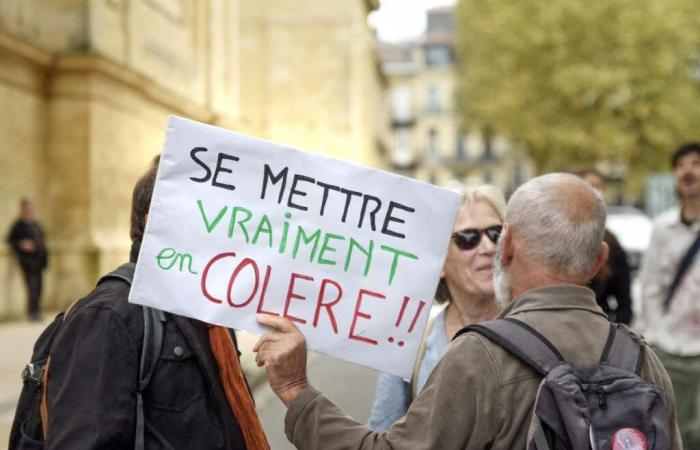
One anger chases the other. With the spectacular improvement in the job market, the French have put the subject of unemployment out of their minds in recent years. In the polls, it no longer appears among their major concerns even though it was their concern for a long time, supplanted today by health, education, inflation and wages. Except that the atmosphere is changing with the announcements of social plans from large groups (Michelin, Auchan) and the hemorrhage which is brewing in certain sectors such as automobiles, distribution or chemicals.
“There will probably be announcements of site closures in the coming weeks and months,” admitted Marc Ferracci, the Minister of Industry, on France Inter, anticipating a social report which “will be counted in thousands of jobs”. This bad news will have an impact on public opinion: “The specter of unemployment had disappeared from the radar. If the series of social plans continues, it could reappear,” predicts Jérôme Fourquet, who heads the Opinions and Strategies department at Ifop.
Read alsoMarine Le Pen or Jean-Luc Mélenchon: who wins the popularity race?
One more anger. The return of this concern risks reinforcing this deep negative feeling expressed by the French. “The discontent is massive and the feeling of belonging to an angry France is growing strongly,” underlines the latest survey on “French Fractures”, carried out for eleven years by the Ipsos institute for Cevipof, the Jean-Jaurès Foundation and the Montaigne Institute.
In the fall of 2023, no less than 45% of French people said they “close to an angry and very anti-establishment France”an increase of 9 points in one year. And 82% considered that the country is in decline, a record since 2016, a diagnosis that is shared by all categories of the population. In the next edition, published on December 2, these indicators are expected to be even more negative, notably because of the mega political disorder in the country, caused by the dissolution of the Assembly.
The great fear of downgrading
Even if it is not new, the exasperation of the French is expressed more and more at the polls through a radical vote, particularly on the far right. The latest elections revealed a tidal wave of the National Rally across the entire territory, with regions (Hauts-de-France, Provence-Alpes-Côte d'Azur) where its candidates obtained more than 45% in the first round. legislative elections, which ensures true ideological domination.
And France has experienced several major outbreaks of violence – the “yellow vest” revolt in 2018, the urban riots of June 2023 – showing that the country is under extreme tension. A tension that the enchanted summer break of the Olympic Games is far from having defused.
The great fear of downgrading. This is what the popular categories and part of the middle class express. “More and more French people are having difficulty reaching the average consumption standard. When you don't achieve it, it gives rise to a strong feeling of being downgraded,” diagnoses Jérôme Fourquet. Hence the hypersensitivity of households to the inflationary crisis of the last three years, especially since the prices of products that we often buy, such as food, have particularly skyrocketed. As a result, a new wave of low-cost consumption has emerged, with a boom in the do-it-yourself economy: consumers are selling more and more objects on the Internet (20% do so once a month) and are assiduously frequenting shopping malls. -attics and clearance sales.
Autun, a textbook case
This feeling of downgrading is particularly strong in this so-called peripheral France, this “diagonal of emptiness” far from the metropolises where jobs are concentrated. Revealing example: in Autun, in Saône-et-Loire, Vincent Chauvet, the mayor (MoDem) of this town of 13,000 inhabitants, takes a tour, with bitterness, of a working-class neighborhood, where social housing has been… destroyed.
“In our country, there are two deaths for every birth. This demographic decline completely changes the situation in small towns, deplores this dynamic elected official. It was necessary to reduce the number of social housing units and close public services due to lack of users. » The maternity ward, two classes of students and the SNCF station have therefore closed down. “This fuels the feeling of decline and powerlessness of the State,” deciphers Vincent Chauvet.
It is also in these areas that the “people of the road”according to the expression of Jérôme Fourquet, suffers from “harassments”, such as speed cameras and the soaring price of cars, including low cost. Motorists who are increasingly becoming “RN people”: 49% of “people who are very dependent on the car on a daily basis” voted for the National Rally in the first round of the last legislative elections, compared to 28% for those “not at all dependent”according to Ifop.
Finally, the anger of this peripheral and rural France is currently illustrated by the demonstrations, sometimes violent, of farmers, many of whom fear disappearing from the map. The figures are edifying: since 1988, France has lost more than 600,000 farms and only has 390,000 left. A gigantic social plan.
Local initiatives
So what to do? In these forgotten towns and villages, local initiatives abound to support small businesses, restore access to healthcare, allow people to travel via solidarity carpooling… Although they appreciate their local elected officials, these French people nevertheless have the feeling that the reforms launched by national leaders do not affect them, or even worsen their situation.
Read alsoThe treaty between the EU and Mercosur hostage to peasant anger
After the “yellow vest” crisis, Emmanuel Macron became aware of this difficulty in changing the daily lives of the French, and instructed his government to follow 84 OVQs (objects of daily life) in employment, public services or security . A rather futile technocratic exercise, which did not make it possible to reverse this feeling of abandonment. No doubt: the very concrete, and not demagogic, political response to these multiple angers of the French remains to be invented.





